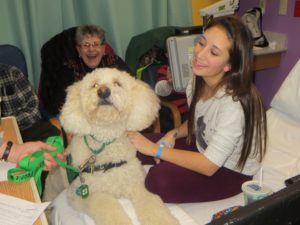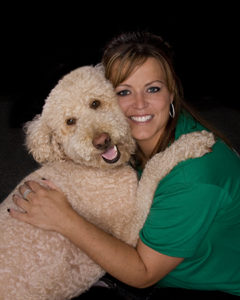PAWS University Course Descriptions
Autism Initiative
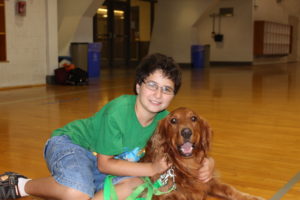 The PAWS Autism Initiative is an animal-assisted activity and therapy program designed to support children on the Autism Spectrum. Our mission is to provide fun and effective opportunities to engage in the world through directed interaction with a certified therapy pet, and a trained handler. The Autism Initiative teams are trained how to use basic behavioral strategies during visits, and are overseen by an individual with knowledge and experience in autism and applied behavior analysis.
The PAWS Autism Initiative is an animal-assisted activity and therapy program designed to support children on the Autism Spectrum. Our mission is to provide fun and effective opportunities to engage in the world through directed interaction with a certified therapy pet, and a trained handler. The Autism Initiative teams are trained how to use basic behavioral strategies during visits, and are overseen by an individual with knowledge and experience in autism and applied behavior analysis.
Highlights:
- Overview of Autism Spectrum Disorder and how it presents
- Understanding typical behavior and communication of a child on the spectrum
- Learn strategies and options to incorporate into your therapy visits
- Understand challenges you will face with this type of visit
- Learn about common situations that arise and how to use your therapy companion as a bridge into the world of the children on the spectrum
Requirements for Autism Initiative Visiting:
- PAWS Basic Orientation and Training
- Advanced Level of STEX
- Autism Initiative training
PAWS will provide appropriate site placement at one of our partnering schools; PAWS staff works cooperatively with both the PAWS team and classroom teachers to ensure engaging and appropriate activities are provided for each child served.
Compassionate Kids
This cour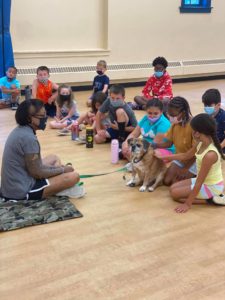 se is designed to teach PAWS teams to help kids (and adults) become familiar with the concepts of Humane Education including respect, compassion, and empathy. The course will equip participants to present this program to groups of children in summer camps, scout groups, schools, etc. PAWS Members who complete this course will be asked to serve as a presenter of the program.
se is designed to teach PAWS teams to help kids (and adults) become familiar with the concepts of Humane Education including respect, compassion, and empathy. The course will equip participants to present this program to groups of children in summer camps, scout groups, schools, etc. PAWS Members who complete this course will be asked to serve as a presenter of the program.
Correctional Facility Training
Correctional Facility Training is a class full of information that will help our PAWS therapy teams by increasing awareness of prison environment, rules, and expectations. Some information is focused on the offenders themselves – the criminal mind, as well as differences between male and female offenders. This is a required class for visiting in partnering correctional facilities.
Creative Connections
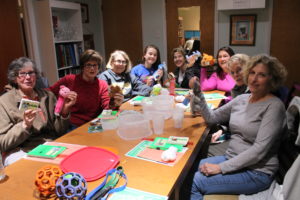 Sometimes petting and brushing your dog isn’t enough during a visit. Working for prolonged periods of time with kids or elders sometimes calls for a few extra “tricks up your sleeve.” We have created a fun, hour-long class that will give you scads of ideas on easy, simple activities you can incorporate into your visits – with not much more than you already have – a dog, treats, and a few well chosen “things” to bring along.
Sometimes petting and brushing your dog isn’t enough during a visit. Working for prolonged periods of time with kids or elders sometimes calls for a few extra “tricks up your sleeve.” We have created a fun, hour-long class that will give you scads of ideas on easy, simple activities you can incorporate into your visits – with not much more than you already have – a dog, treats, and a few well chosen “things” to bring along.
Highlights:
DeStress
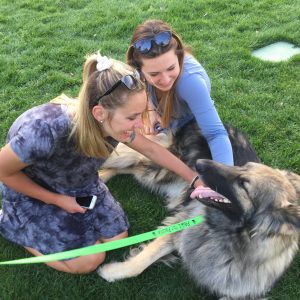 We used to only visit college students on campuses to help them relax during midterms and finals. Now our DeStress sessions have moved into other levels of education, hospitals, and even into the corporate world where employees certainly need a little time to relax with one of our therapy pets. This class will help you understand the needs of the folks we’re visiting and give you a better sense of how you can support them while you offer them the fun and fluff of your pet. Dogs welcome.
We used to only visit college students on campuses to help them relax during midterms and finals. Now our DeStress sessions have moved into other levels of education, hospitals, and even into the corporate world where employees certainly need a little time to relax with one of our therapy pets. This class will help you understand the needs of the folks we’re visiting and give you a better sense of how you can support them while you offer them the fun and fluff of your pet. Dogs welcome.
Disabilities
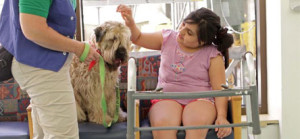 PAWS therapy teams work with individuals with a wide range of disabilities. Understanding common disabilities, whether physical, cognitive, or emotional, can help PAWS teams to provide more individualized visits as well as assist professionals on site encourage and motivate their patients to increase participation in therapeutic activities. Training is currently under revision.
PAWS therapy teams work with individuals with a wide range of disabilities. Understanding common disabilities, whether physical, cognitive, or emotional, can help PAWS teams to provide more individualized visits as well as assist professionals on site encourage and motivate their patients to increase participation in therapeutic activities. Training is currently under revision.
Highlights:
- Learn about common physical, cognitive and emotional disabilities
- Learn displaying behaviors of many disabilities – and what generalized approach is best to ensure a successful visit
- Participate in role modeling and practice sessions (PAWS Therapy companions are welcome at this session!)
Requirements for Disabilities Visiting:
- PAWS Basic Orientation and Training
- Basic Level of STEX (Advanced STEX required for working with children/adolescents)
PAWS will provide appropriate site placement at one of our partnering sites and one to two accompanied visits to the site.
First Visit Assistant Training
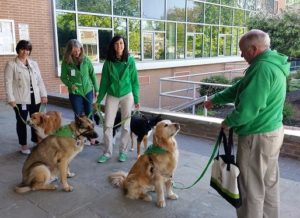 PAWS welcomes experienced volunteer pet therapy team members to help newer teams familiarize themselves with the visiting process. Participation in this program offers PAWS service hours to teams.
PAWS welcomes experienced volunteer pet therapy team members to help newer teams familiarize themselves with the visiting process. Participation in this program offers PAWS service hours to teams.
Learn how to best assist other PAWS team volunteers on first visits including:
- Support
- Introductions
- Refresher on PAWS visiting techniques
- Logistics
- Smiling
Requirements to become a First Visit Assistant:
Grand PAWS
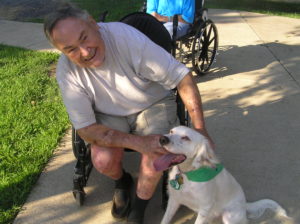 The focus of our GrandPAWS course is placed on how the needs and concerns of elders impacts visiting compared to general visiting. Please join us if you are currently visiting in assisted living, skilled care, hospitals, dementia units, or adult day cares – or just want to learn some new visiting skills.
The focus of our GrandPAWS course is placed on how the needs and concerns of elders impacts visiting compared to general visiting. Please join us if you are currently visiting in assisted living, skilled care, hospitals, dementia units, or adult day cares – or just want to learn some new visiting skills.
Intake Caller Training
 Remember when you first contacted PAWS to learn about our organization? After completing your online application, one of our volunteer intake callers contacted you to walk you through our membership process and answers any questions you may have had.
Remember when you first contacted PAWS to learn about our organization? After completing your online application, one of our volunteer intake callers contacted you to walk you through our membership process and answers any questions you may have had.
We are currently looking for more pet therapy teams (active, inactive or retired), who are interested in providing this valuable service to prospective members!
During this training you will:
- Learn the membership process – from the PAWS side
- Ask what questions to ask prospective team members – and why
- Run through a practice intake call
After the completion of this training, you will:
- Receive a PAWS Intake script to work with new teams on intake calls
- Receive a special pin indicating you are an OFFICIAL INTAKE CALLER
- Receive a certificate of completion
Prerequisites for Intake Caller Training are:
There is no fee for this training!
PAWS for Reading
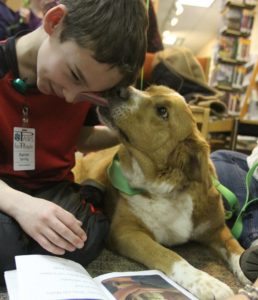 Our PAWS for Reading program is based on the concept that a pet’s non-judgmental acceptance and loving attention can help new and struggling readers feel more comfortable and less self-conscious when reading aloud. These sessions create a forum where readers can practice their skills in a “safe” place without criticism. PAWS’ goal is to provide a positive reading experience where the reader builds confidence, strengthens literacy skills, and develop a love for reading. PAWS for Reading sessions are held during the day at schools and in the evening at libraries on a regular, set schedule. Meet the furry companions working in this program in our Reading PAWS gallery!
Our PAWS for Reading program is based on the concept that a pet’s non-judgmental acceptance and loving attention can help new and struggling readers feel more comfortable and less self-conscious when reading aloud. These sessions create a forum where readers can practice their skills in a “safe” place without criticism. PAWS’ goal is to provide a positive reading experience where the reader builds confidence, strengthens literacy skills, and develop a love for reading. PAWS for Reading sessions are held during the day at schools and in the evening at libraries on a regular, set schedule. Meet the furry companions working in this program in our Reading PAWS gallery!
Highlights:
- Learn the philosophy of PAWS for Reading – and understand why it is so successful
- Identify typical behaviors of a struggling reader and how to respond appropriately
- Understand the setup of this type of visit and the challenges you may encounter
- Learn how to integrate your therapy companion into a reading session and how to create a bridge to reach a reluctant reader
- Receive incentives and hands-on materials to use during reading sessions
Requirements to become a PAWS for Reading Team:
PAWS will provide appropriate site placement at one of our partnering libraries or schools and one to two accompanied visits to the site.
Pre-K PAWS
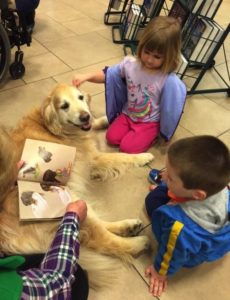 Pre-K PAWS focuses on the special academic needs of 3 and 4 year old pre-readers. Using specially developed activity packets and a great therapy companion, our teams work with pre-readers on basic learning concepts. Our activity packs include matching colors and numbers, tracing lines, matching body parts, and more. This is an interactive way to encourage emergent readers to be excited about reading while accompanied by a loving, non-judgmental therapy companion. Pre-K PAWS programs are held during the day at partnering schools and libraries.
Pre-K PAWS focuses on the special academic needs of 3 and 4 year old pre-readers. Using specially developed activity packets and a great therapy companion, our teams work with pre-readers on basic learning concepts. Our activity packs include matching colors and numbers, tracing lines, matching body parts, and more. This is an interactive way to encourage emergent readers to be excited about reading while accompanied by a loving, non-judgmental therapy companion. Pre-K PAWS programs are held during the day at partnering schools and libraries.
Highlights:
- Receive an overview of Pre-K PAWS
- Understand typical behavior and communication patterns of pre-readers
- Review of all Pre-K Activity packs
- Receive a Pre-K PAWS bag to use while working in this program
Requirements for Pre-K PAWS visiting:
- PAWS Basic Orientation and Training
- Advanced Level of STEX
- PAWS for Reading training
- Pre-K PAWS training
PAWS will provide appropriate site placement at one of our partnering libraries or schools and one to two accompanied visits to the site.
Thinking Outside the Box (PAWS’ Dementia Program)
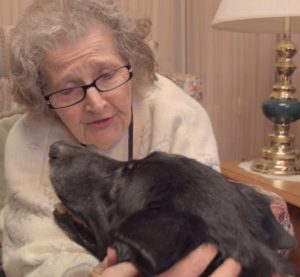 Many PAWS teams visit with elders, several of whom are in various stages of dementia. Our Thinking Outside the Box program trains therapy companions to better understand dementia and Alzheimer’s, recognize displaying behaviors, while also guiding teams on how to provide the best visit possible to someone following this path. In better understanding why folks are behaving in a particular manner, teams can provide a more personalized visit that supports the elder. Teams are also able to assist site staff in accomplishing some of the tasks/goals that may become difficult with a person suffering with dementia.
Many PAWS teams visit with elders, several of whom are in various stages of dementia. Our Thinking Outside the Box program trains therapy companions to better understand dementia and Alzheimer’s, recognize displaying behaviors, while also guiding teams on how to provide the best visit possible to someone following this path. In better understanding why folks are behaving in a particular manner, teams can provide a more personalized visit that supports the elder. Teams are also able to assist site staff in accomplishing some of the tasks/goals that may become difficult with a person suffering with dementia.
Highlights:
- Understand the parts of the brains and how certain areas of the brain control the areas often affected by dementia
- Learn how to validate feelings skillfully
- Discover how to incorporate the therapy animal into the visit to provide encouragement, reassurance, reason for movement and comfort
Requirements for Thinking Outside the Box visiting:
- PAWS Basic Orientation and Training
- Basic Level of STEX
- Thinking Outside the Box training (Two-part session)
PAWS will provide appropriate site placement at one of our partnering elder care facilities and one to two accompanied visits to the site.
Trauma Support & Trauma Basics
Trauma Support
Many of our therapy teams visit with members of the public who have either suffered a loss, have changing life events, or are enduring pain. In order to understand what trauma is and how it may affect ourselves and others, we urge you to attend the Trauma Support training session. In this course, you will not only learn about the symptoms and types of trauma, but also how you and your therapy companion can assist traumatized folks during a visit. The three-hour course focuses on dealing with deep emotions as well as self-care of the therapy team.
Trauma Basics
This course helps pet therapy teams understand what trauma is and how it manifests itself with people, particularly in children and adolescents. It also focuses on specific techniques you and your therapy companion should – and should not – use while working with people suffering from trauma. This course can be taken alone or along with a training module specific to program locations PAWS currently visits.

